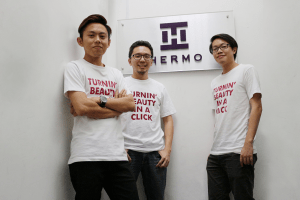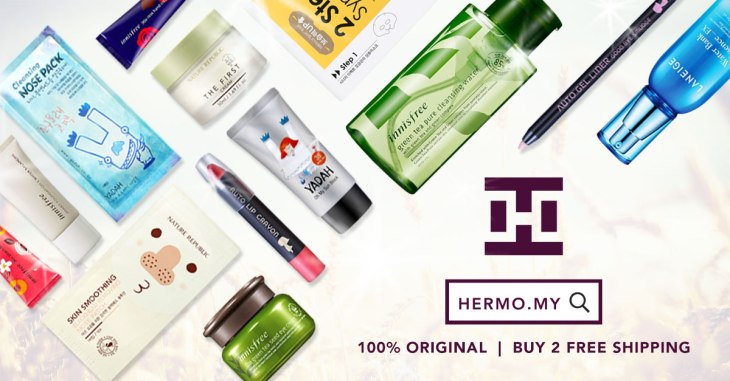Browsing for beauty products should be relaxing, but anyone who has visited a makeup counter knows that you often weather a deluge of upselling before finally escaping with a purchase. Hermo, a Malaysia-based e-commerce site, wants to make cosmetics shopping fun for customers in Southeast Asia. The site, which also operates in Singapore and is planning to expand into Indonesia soon, just announced a $2 million Series A from Gobi Partners.
The capital will be used for product development and hiring as Hermo prepares for its Indonesia debut. Its last funding was a RM 450,000 (about $100,000) seed round raised in February 2012, when the company launched.
Chief executive officer Ian Chua say he and his co-founders, chief operating officer Ian Mok, and vice president of merchandise P.S. Chong, wanted to start an online retail business in Southeast Asia because they believe “that the future of retail in the region will be driven by e-commerce.”
They homed in on cosmetics and skincare after seeing “the amount of time our female friends and family spent picking out cosmetics products,” explains Chua. As the trio did more market research, they also discovered that beauty products enjoy strong margins that remain consistent even during market fluctuations and enjoy higher levels of customer loyalty than other types of products.
Hermo’s business model combines flash sales with regular inventory and it specializes in premium brands. The startup maintains direct relationships with its suppliers, which means it can offer lower prices, more products, and avoid counterfeits, a problem on some marketplaces.
Its founders have lofty goals for Hermo.
“Eventually we see ourselves dominant in Southeast Asia,” says Chua. “We will have significant operations within three countries by the end of the year—Malaysia, Singapore, and Indonesia. We are already the top cosmetics e-commerce site in Malaysia and we believe we can duplicate this success in other markets. The Internet, particularly mobile, is experiencing rapid growth. We already take nearly half of our orders from our mobile site. Southeast Asia is a mobile-first market and we are well-positioned to capture this trend.”
The company now claims over 150,000 monthly active users and says it has been profitable for a year now. Its revenue reached RM 10 million (about $2.4 million) during the twelve months ending in September, representing a three times year-on-year growth.
Surfing The Korean Wave
Hermo competes with Luxola, which acquired by cosmetics retail giant Sephora last year and ships to nine countries, including Singapore, Malaysia, Hong Kong, and the Philippines.
Both sell luxury products, but Luxola focuses on western brands, while Hermo’s specialty is Asian beauty companies. It has a supplier relationship with French brand L’Oreal, but Hermo’s bestsellers come from South Korea. The country’s cosmetics industry is currently enjoying a growing profile around the world (another example of an e-commerce startup riding the “Korean wave,” as the trend for Korean pop culture and products is known, is Seoul-based Memebox, which has raised $29 million in funding and is expanding into China and the U.S.).

Hermo founders Ian Chua, Ian Mok, and P.S. Chong
Another competitor is e-commerce Lazada, which has a cosmetics vertical and has grown rapidly throughout Southeast Asia thanks to generous backing from Rocket Internet. Chua believes Hermo’s focus on localization, however, will give it an edge.
While Internet and smartphone penetration is growing quickly in Southeast Asia, it still varies widely from country to country. Chua notes that most cosmetics purchases in Southeast Asia are still made in brick-and-mortar stores, but believes more shoppers will start buying makeup online because they can find better prices, a wider selection of products, and user feedback (Hermo has a “beauty wall” with over 50,000 customer reviews).
Regional logistic companies, including aCommerce and SingPost, are busy growing their delivery networks, which will help Hermo because it has to guarantee timely deliveries and fast returns (Chua says that the company has discussed in-house logistics to have more control over customer service quality, but has no concrete plans yet).
Chua points out that Southeast Asia is a fragmented marketplace and Hermo will have to deal with different consumer demands in each market, new languages, and local regulatory issues. Instead of hindering growth, however, Chua believes this emphasizes how important it is for Southeast Asian startups to launch with an expansion strategy in mind.
“That’s why I believe that somewhere out there in Southeast Asia, there is a global-level unicorn just waiting to be discovered. If you can expand and succeed in Southeast Asia, it makes your company better positioned to succeed globally through that experience.
